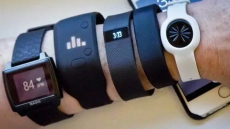TORONTO — Canadian researchers have determined the peak of the hepatitis C epidemic in North America occurred about 15 years earlier than previously believed, suggesting it wasn't youthful indiscretions that put baby boomers at a high risk for the disease.
And that means, say researchers, that all those who belong to the post-Second World War generation should be screened for the potentially deadly infection, which can take up to 50 years to manifest symptoms.
An estimated 300,000 Canadians are infected with hepatitis C, with baby boomers — the generation born between 1946 and 1964 — making up about 75 per cent of cases.
Over time, hepatitis C can severely scar the liver, leading to cirrhosis, and is a known cause of liver cancer as well as liver failure.
It was long thought that boomers who were infected with the blood-borne virus likely contracted the disease in their late teens or early 20s, due to such risky behaviours as IV drug use or sexual experimentation.
But a study by B.C. researchers found the peak of the hepatitis C epidemic occurred about 1950, when many baby boomers were young children, and had plateaued by 1960 — well before the zenith of injection drug use at the end of that decade.
The oldest of the baby boomers were just five years old at the peak of the epidemic, the researchers say.
"The spread of hepatitis C in North America occurred at least 15 years earlier than it was suspected before, and if that is the case, the baby boomer epidemic ... cannot be explained by behavioural indiscretions on the part of the baby boomers," said co-investigator Dr. Julio Montaner, director of the BC Centre of Excellence in HIV/AIDS.
"We suspect that this is more likely attributable to medical practices at the time," said Montaner, explaining that hepatitis C hadn't yet been identified and injections and blood transfusions were given employing reusable glass-tube syringes and metal needles, which were subject to contamination despite boiling.
"The baby boomers in North America ought to be offered hepatitis C screening," he said, "not because they did anything wrong but because they are baby boomers, and so they were alive at a time in which the standard of care was such that we are all potentially at risk of having contracted hepatitis C."
A plateau in the spread of hepatitis C infections was observed between 1960 and 1990, consistent with the hypothesis that changes in injection technology were a driving factor.
Montaner suggested that stigma associated with a diagnosis of hepatitis C — arising from the belief the infection was contracted due to IV drug use or "rough sex" — has been misplaced.
"So hepatitis C testing has always carried a certain degree of stigma and it's been a difficult conversation," he said from Vancouver. "So people have been generally not coming forward to test, and physicians had usually not been offering hepatitis C screening very readily.
"But we feel that now that we recognize that there is no behavioural pattern that can predict risk for hepatitis C that this is a lot more of a random event in the baby boomers, and we need to in Canada formally recommend that all baby boomers be screened for hepatitis C."
To conduct the study, published this week in the journal Lancet Infectious Diseases, researchers analyzed genetic sequences of the virus from samples collected in B.C. Over time, the genetic signature of the virus alters due to mutations, allowing the scientists to clock when rates of infection waxed and waned.
They then did the same thing with 45,000 genetic sequences collected by the U.S. Centers for Disease Control in Atlanta and found the time clock results matched those in their home province.
"Viruses accumulate mutations in a specific time sequence, which allows you to catalogue viruses and by extrapolation you can (determine) the origin of genetic spread," explained Montaner. "It tells you when the virus was introduced into the population and how fast it spread.
"A virus that looks the same belongs to the same generation. Those that are different and evolved in a particular way are the next generation."
In an article this month in the journal Clinical Infectious Diseases, the CDC reported that hepatitis C deaths in North America are on the rise, while mortality rates for such infectious diseases as HIV/AIDS and tuberculosis are dropping.
"So hepatitis C is a time bomb and it's obviously not being addressed appropriately," said Montaner, adding that recently developed medications can now cure the disease in up to 95 per cent of cases.
Formal screening programs should be provided by the provinces and territories to detect the disease, so immediate treatment can be offered to those found to be infected, he said.
"The problem is that hepatitis C takes somewhere around five decades to evolve into significant disease," and anyone who is infected could be an asymptomatic carrier, capable of infecting others through their blood. (Canadian Blood Services has screened donations for hepatitis C since 1992, after an estimated 20,000 Canadians contracted the virus through transfusions.)
"Waiting for people to develop symptoms to be diagnosed and treated is too late, particularly because some of the damage that comes from hepatitis C would be irreversible," stressed Montaner.
Most North Americans with hepatitis C belong to the baby-boom generation, Dr. John Ward, director of the division of viral hepatitis at the CDC, said in a statement.
"And most are unaware that they have this infection."





